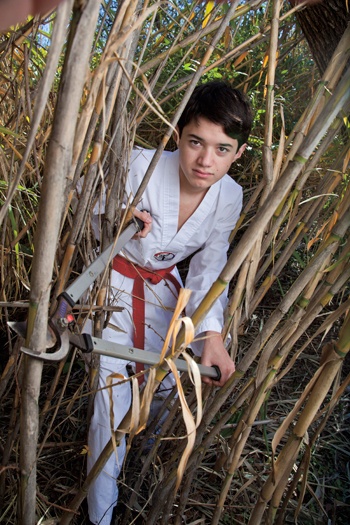Be afraid, salt cedars. Listen up, giant reeds. Surrender or else, Chinese privets, bastard cabbage and wax ligustrums. Commander Ben, the Invasive Hunter, has declared intergalactic war against dastardly species of your kind, and he plans to win, one karate chop at a time.
Who might this fearless hero be? In real life, he’s Benjamin Shrader, a 14-year-old home-schooler from Lakeway who has a flair for science, acting and moviemaking. Far from shy, the creative teen stars in and produces his own “Commander Ben” episodes, which he uploads to YouTube. He also posts interviews with noted scientists, researchers and other experts on such hot topics as Rasberry crazy ants, DNA sequencing and the Texas drought. One time he ate a live mealworm on camera.
“Commander Ben is a kid who just wants to help the ecosystems that he loves,” Benjamin says of his goofy but tough alter ego who wears a white martial arts suit and red belt whenever fighting leafy villains. “It’s real important that we teach kids about invasives early. Before the cement dries, so to speak.”
Through his mobile Invasive Hunter Academy, Benjamin teaches kids about common invasive species, demonstrates how to palm-heel strike them down and has them draw up their own battle plan. Last year he took his academy to Kids Day at the U.S. Botanic Garden in Washington, D.C., as part of National Invasive Species Awareness Week. He also participated in Nature Nights, a summer program at the Lady Bird Johnson Wildflower Center in Austin.
“Invasives are an ecological problem that few 14-year-olds are even aware of,” says Damon Waitt, senior director and botanist at the Wildflower Center. “Ben is unique not only because of his own interest but also because he’s engaged other youth in this important issue. It’s great to have him in our camp.”
On camera and off, the teen often participates in volunteer projects, such as clearing Chinese privet from areas of the Balcones Canyonland Preserve in Travis County. “Ben’s a hard worker,” says Louise Liller, volunteer coordinator with the Wildland Conservation Division at the City of Austin. “But more than that, he’s interested in the bigger picture, like how invasives can impact a habitat.”
At an early age, little rocks and shells fascinated Benjamin. “In his high chair, he’d examine small things but never put them in his mouth,” recalls mom Mary Shrader. “One day after watching him, I called my husband, Ted, and told him, ‘We have a scientist in the making!’ ”
A gifted storyteller, too. As soon as he could talk, Benjamin began weaving tales of make-believe heroes whom he named Action Mummy and Commander Ben. “Whenever we’d drive somewhere, he’d be in his car seat, sitting in the back seat and telling me, ‘And then … and then,’” Mary laughs. “Finally, Ted would tell him, ‘OK, Benjamin, we’re going to have some radio time now!’ ”
At 5, Benjamin scooped tadpoles from the family’s pond and raised them in a fish tank in his bedroom. Because toads can only detect food that’s moving, he devised a way to use ripples from the tank’s filter whenever he dropped fish flakes atop the water at mealtimes. After the tadpoles morphed into toads, all but two returned to the pond. Chub Chub and Medium Chub lived several more years in the tank before Benjamin released them, too.
Once, he rescued an albino catfish from an Asian fish market. Faced with a language barrier, Benjamin urgently pantomimed that he wanted to buy the white one alive. Finally, the butcher understood. The fish rode home with the Shraders in a water-filled bin hurriedly bought at a nearby discount store. It lies buried in Mary’s garden, as do many of her son’s deceased beetle buddies.
Life in the Shrader household turned even more interesting when Benjamin and his dad read a newspaper article about the economic and ecological damage caused by invasive plants in Texas. The story inspired Benjamin to put together a science fair project on giant reeds, an exotic perennial grass that can grow 20 or more feet high and quickly crowd out native plants. His entry snagged second place in the elementary school sixth-grade division in the Austin Energy Regional Science Festival in February 2011.
Not long thereafter, Benjamin—who uses technology to help him deal with dyslexia—heard about a video contest. So he took what he’d learned about giant reeds and produced a five-minute film. His entry, “Who Will Fell This Titan?,” won first place in May 2011 at the Science Under the Stars contest sponsored by the Brackenridge Field Laboratory with The University of Texas at Austin. The spoof, featuring Benjamin’s childhood character for the first time, entertains and educates.
“The giant reed is a dark plant,” growls Commander Ben, standing in front of a reedy backdrop. “It must be destroyed, and I’m going to tell you why.”
Hooked on his new endeavor, Benjamin set to work on more videos. “Tea Time with English Ivy” has Commander Ben in fumes at the aggressive vine, which has caused him to lose his appetite for a plate of scones. “In an Ecesis Far, Far Away,” the exiled, one-eyed warrior recalls how he foolishly tried to teach his friend, the (invasive) elephant ear, how to hunt invasive plants.
In a few videos, Benjamin’s father makes a fleeting cameo appearance. Largely, though, Ted stays behind the camera and films. “Benjamin does everything else himself,” Mary says. “He writes his own scripts, acts, directs and edits the films. He’s incredibly tenacious and self-motivated.”
As for the future, Benjamin’s not sure where he’s headed. “I love making movies and acting,” he muses. “I just know I want to help the good guys win!”
——————–
Sheryl Smith-Rodgers, frequent contributor
The Shraders are members of Pedernales Electric Cooperative.
Visit Benjamin Shrader’s blog about his adventures fighting invasive plants and about having dyslexia.


